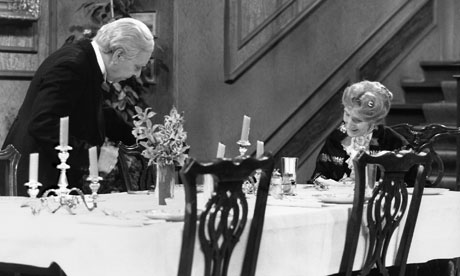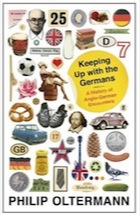What's German for funny?
What makes Germans laugh – and why is it so different from what amuses the British? The answer may lie in a slapstick English comedy that became a TV favourite in Germany

Freddie Frinton and May Warden in the 1963 television film Dinner for One. Photograph: Sportsphoto Ltd/Allstar
The sketch is called Dinner for One, and it is easily described. The curtain opens on butler James laying a lavish dinner table. The lady of the house, Miss Sophie, wearing an elegant evening dress, descends a flight of stairs, and sits at the head of the table. We soon realise that it is her 90th birthday, and that something is not quite right. "Is everybody here?" Miss Sophie asks. "They're all here waiting, Miss Sophie, yes," James says, gesticulating towards the empty seats around the table. "Sir Toby?" Sophie asks. "Sir Toby is sitting here," James says, patting the back of the chair on Miss Sophie's right, and continues to assign seats to the imaginary guests named by his mistress: "Admiral von Schneider", "Mr Pommeroy" and "my very dear friend, Mr Winterbottom".
The evening continues in this vein. James serves four courses: mulligatawny soup, haddock, chicken and fruit. With each, Miss Sophie requests a different drink: first sherry, then white wine, then champagne, then port. In the absence of any actual people around the table, James impersonates the different guests and toasts the host on their behalf. With each course, James's walk becomes less stable, his tour around the dining room more haphazard.
Much of the comedy in Dinner for One is slapstick, knockabout stuff: James spills wine, drops food, crashes into furniture and downs the water in the flower vases instead of what's in the port glasses. But the most memorable comic moment in the sketch is verbal. Before each change of wine, James stops short: "By the way, the same procedure as last year, Miss Sophie?" The mistress of the house looks accusingly at her servant: "The same procedure as every year, James." At the end of the sketch, Miss Sophie decides to retire to her bedroom. James, now completely drunk, offers his arm. For a final time, there is the catchphrase – but this time, the effect is different: "Same procedure as last year, Miss Sophie?"
"Same procedure as every year, James."
"Well, I'll do my very best."
As he is dragged offstage, James winks at the audience, baring his gappy teeth for a Cheshire-cat grin.
Originally scripted by the variety playwright Lauri Wylie in the 1920s,Dinner for One, also known as The Ninetieth Birthday, used to be a staple in the music-halls of seaside resorts from Blackpool down to Brighton: a very British kind of pleasure. Very British, that is, until German TV show host Peter Frankenfeld and director Heinz Dunkhase watched the sketch at Blackpool's Winter Gardens in August 1962. Straight after the show, Frankenfeld convinced the two performers – veteran comic Freddie Frinton and 72-year-old May Warden – to record their act for German TV, even though it took the show almost another 10 years to find an audience there.
On New Year's Eve 1972, NDR, northern Germany's regional television channel, screened the sketch at 6pm, and something clicked. In fact, something amazing happened: Germany fell utterly in love with it. People put down their plates of potato salad and left their frankfurters to cool; entire parties huddled around the television set. The following year, each of the regional channels showed Dinner for One at 6pm, and a few showed a repeat four hours later. Since 1963, the sketch has been screened 231 times to German audiences, making it the most repeated show on German television, and, according to the Guinness Book of World Records, the most popular show in TV history. In 2004, 15.6 million Germans watched it.
I grew up in the north of Germany and know Dinner for One practically off by heart. The first time I watched it I was five – it must have been either the first New Year's Eve that I was allowed to stay up late, or the first time I actually had the stamina to. Through my teens, the sketch stayed with me and continued to reveal new layers of interest: when puberty stirred, the double entendre of the line "Same procedure as every year" mystified me. "I'll do my very best." Best what? He didn't mean that, did he? They're so ... old. And if so, where? And how? And for how long? The ambiguity drove me insane. Perhaps the fact that Dinner for One dealt in such universal taboo subjects as sex between the elderly accounted for some of its cult status. But then why was the sketch so particularly popular in Germany?
One reason might be that there is so little talking in the film. By wooing the audience for laughs with physical gestures rather than words, the sketch managed to tap into a specifically German distrust of language – the same mindset that had made it the natural home of silent cinema in the 1920s.
Spike Milligan famously said that "the German sense of humour is no laughing matter", and it will take time to shift that cliche: a poll last yearrevealed the Germans are still considered the unfunniest nation in the world. Of course, it's not as simple as that: it's just that German comedyspeaks its own language. Even today, most comedy in Germany is generally more physical and knockabout than in Britain, though this is not to say that it is all as crude and basic as a Benny Hill sketch.
I was reared on a wide range of comic acts: at one end of the spectrum was Otto Waalkes, a modern version of the circus clown, with oversized dungarees, a bald pate, a trademark bunny-hop walk and goofy laughter. At the other end was the late Vicco von Bülow, better known as Loriot: a more subtle act, whose sketches were usually set in the socially awkward realm of the upper middle class, a world of fine dining, book clubs and boardroom meetings. And yet the core of Loriot's act was essentially physical. One of the most popular Loriot sketches is reminiscent of Dinner for One: a couple are at a table in a restaurant, eating soup; the man noticeably nervous. As he wipes his mouth with his napkin, a noodle gets stuck on his chin. The woman tries to point this out, but the man interrupts her. For the rest of the sketch, the rogue noodle travels from his chin to his finger to his forehead to his earlobe. The comic effect is heightened by the fact that the man is trying to have a serious conversation about their relationship, but the popularity of the sketch is essentially all down to the noodle.
German humour's reliance on the physical is not just apparent on television, but also in the way Germans act on a day-to-day basis. After or before they have made a joke, many Germans will make a physical gesture to signpost their intention: sometimes just an expressively raised eyebrow, sometimes something more emphatic. Not for nothing are jokes also known as Schenkelklopfer, "thigh-slappers".
The decorum of English joking couldn't be more different. When I first moved to London in 1997, and the boys at my school made jokes, there was nothing in their body language to demonstrate it – no funny voice, no grimacing, no slapping of thighs. Particularly in my first year, I was caught out innumerable times by this. There was the vocabulary test that my classmates had warned me about that never happened, the boy who said his father was the prime minister who wasn't, the teacher who said he had been drafted into the Oxford and Cambridge boat race at the last minute who hadn't. They had all told blatant lies without raising an eyebrow. Deadpan joke-telling seemed to come from the same mentality as the British art of understatement: the point was that you would by all means avoid making an outward show of what was going on inside your head.
In Germany, the signposting of puns and punchlines is particularly common in the gigantic beer tents of the Munich Oktoberfest and the cities of Mainz and Cologne, where people dress up in clown costumes every November to celebrate Karneval. Büttenreden are a staple of the German carnival tradition. Historically, they used to involve a comedian standing on an upturned tub (a Bütt) telling a jokey story in rhyming iambic pentameter.
Here is a particularly unfunny example that I heard a few years ago, at a carnival party in Cologne: "Ihre Gesichtszüge sind ihr total entglitten, Sie dachte wohl jetzt an ihre Titten." Without the rhyme on the last syllable, it translates as: "She had lost control of her facial features/ She was probably thinking of her tits." In case someone in the audience should have missed their cue, a trumpet will sound after each punchline: da-doo da-doo da-doo. They might as well hold up signs reading: "Please laugh now!"
The ultimate reason that Germans love Dinner for One may be that it is a funny sketch about something that isn't very funny at all. It is, after all, a comedy that deals in death and meaningless rituals: what has happened to the British and German gentlemen who are no longer with James and Miss Sophie? It allowed Germans to chuckle at a very sinister thought: that history was only ever repeating itself in meaningless loops, that nothing was ever changing. And in a roundabout way, to break the greatest German taboo of them all: to laugh about the war.
The question remains why Dinner for One has been ignored in its country of origin – it has, for example, still never been shown on the BBC. On the occasion of the sketch's 40th anniversary in 2003, Der Spiegel published an article called "Why the BBC is still shunning Dinner for One", in which author Sebastian Knauer suggested that social anxiety might have played a part, since the sketch subversively poked fun at the English class systemvia the portrayal of heavily intoxicated aristocrats such as Sir Toby and dangerously seductive aristocratic figures such as Miss Sophie. At best, that argument strikes me as badly researched. Class has always played a central part in British comedy, from Hogarth's A Rake's Progress through PG Wodehouse's Jeeves and Wooster novels to Roy Clarke's 1990s BBC sitcom Keeping Up Appearances featuring Hyacinth Bucket, or as she would have it, "Bou-quet".
In March 1998, I brought a VHS tape of Dinner for One along to an after-school film club at my new English school. Many of my schoolmates chuckled, some of them thought it was genuinely funny, but none of them were overwhelmed. Slapstick, once the height of comic inventiveness, is now considered passe, the stuff of dusty Benny Hill collections, not primetime TV. Standup was a descendant of the music-hall tradition, of course, but it was a slimmed-down version, which relied almost exclusively on the verbal. With the slippery, bendable qualities of English, the evolution of comedy from physical to verbal was a much smoother transition in Britain than in Germany. German, with its suspension-bridge structure and modal particles, is poorly equipped to create moments of surprise.
"A German comedy is like a German sentence," George Eliot once remarked. "You see no reason in its structure why it should ever come to an end." English, on the other hand, with its malleable sounds and one-syllable words, feels custom-made for comedy. An English sentence can be flipped upside down like a pancake, its meaning completely changed by the mere variation of a syllable. The pay-off at the end of Dinner for One – "Same procedure as every year, James" – gives a hint of what the English language can do, but the Eddie Izzards, Jo Brands or Bill Baileys who found fame in the 1990s were so much faster, so much slicker than that. In my first year in England, I remember watching an episode of Have I Got News for You in which Paul Merton said: "There are various ways to give up smoking – nicotine patches, nicotine gum … my auntie used to pour a gallon of petrol over herself every morning." This sort of thing makes the ending of Dinner for One look very safe and toothless.
Perhaps the main reason why Dinner for One never found a following in Britain is not that it deals with awkwardness about class relations, but that TV sketch shows were no longer the only places where that awkwardness could be dealt with. Comedy in 21st-century Britain is no longer an exception to the norm; it is the norm. In Germany, comedy still patrols the closely guarded border between seriousness and silliness, between work and leisure; in post-industrial Britain, however, those borders are increasingly being broken down. Here, comedians write newspaper columns, they host political discussion shows and campaign for reform of the voting system. Comedy has become the British gut reaction to anything big, clever or vaguely intimidating.
By the time I moved to Britain, there was a commonly expressed view in the German press that England was a country tragically stuck in the past, obsessed with its glorious role in the second world war, unable to shake a German's hand without making some daft joke about the Nazis – all true, to an extent, just not the whole truth. In many ways, one British comedy had already come up with a much more convincing explanation for this. John Cleese's Basil Fawlty desperately tries to be serious when he meets his German guests at Fawlty Towers, yet he cannot stop himself from reverting to the English instinct of black-humoured wordplay:"That's two egg mayonnaise, a prawn Goebbels, a Herman Göring and four Colditz salads." Basil Fawlty reminds us that postwar Anglo-German relations weren't just complicated by changing economic fortunes and a rapidly unfolding European project, but also by increasingly divergent ideas of what humour could and should do.
This is an edited extract from Keeping Up With The Germans: A History of Anglo-German Encounters, published by Faber & Faber on 16 February 2012 at £12.99.



No comments:
Post a Comment